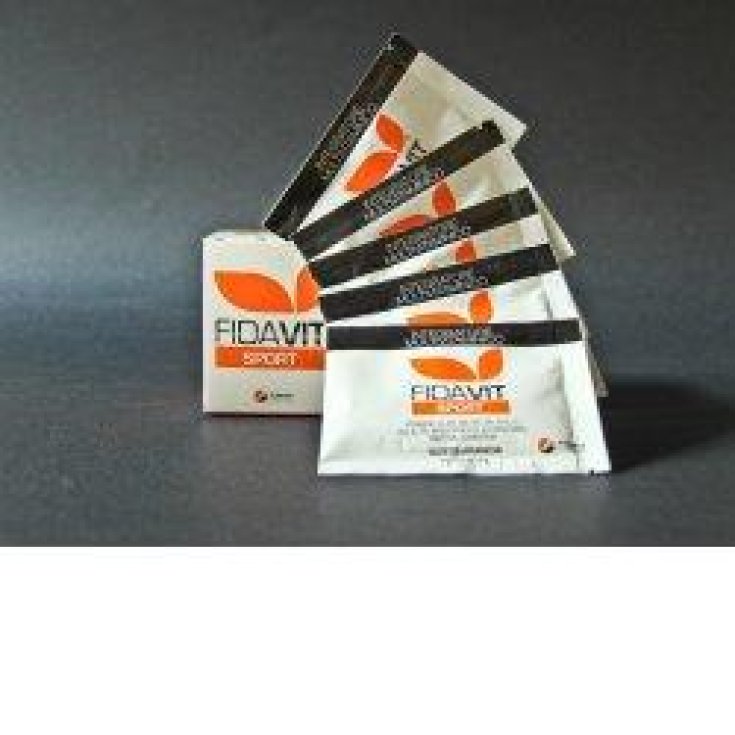Fidavit Sport 10bust
11.40€
12.00€

- Brand: FIDANZA VITAMINICI Srl
- Product Code: 931998227
- EAN:
- Availability: In Stock
- Purchase 3 items for 11.17€ each
- Purchase 4 items for 10.94€ each
- Purchase 5 items for 10.72€ each
FIDAVIT
SPORT
Food supplement that contains all vitamins at their maximum permitted dosage and which can represent a useful support for the body in case of deficiency or increased need for these nutrients. It is recommended in cases of deficiency or increased need for these nutritional elements, especially in the case of intense and prolonged physical activity over time to promote muscle recovery.Vitamins of group B
They are water-soluble vitamins and act as coenzymes in most metabolic processes. They are particularly important in cell division, as carbon transporters in the formation of heme present in hemoglobin, a fundamental protein for the formation of red blood cells and for the storage of iron in muscles. They are also necessary for the synthesis of nucleic acids, essential in the growth and reproduction processes of the cells of the body, as well as for the correct functioning of the brain, concentrating in the cerebrospinal fluid.
C vitamin
O ascorbic acid is a water-soluble vitamin that has essential characteristics for man, which means that it must be compulsorily supplied from the outside. Vitamin C has a well-known role in the formation of collagen but also plays, as better understood only in fairly recent times, many other functions in the body being involved in numerous biochemical steps and influencing many enzymatic and physiological processes such as promoting the absorption of other vitamins and minerals such as iron. It is fundamental in the repair processes and in assisting the immune defenses.
Vitamin H
Or biotin, which also belongs to the B vitamins, is found in particular in foods of animal origin and has a fundamental role as a cofactor-enzyme, especially in the liver in the production of fatty acids and in the metabolism of branched chain amino acids. Its action is fundamental in relation to skin appendages such as skin, hair and nails.
Vitamin A and β-carotene
This vitamin and provitamin have a fundamental role for the proper functioning of sight but also for the skin and mucous membranes and above all to protect these tissues from the harmful action of free radicals and from premature aging. In particular, at the ocular level, retinol is transformed into retinal (or retinaldehyde) which, by associating itself with a protein complex, produces rhodopsin. The latter, activated by light, generates electrical impulses favoring the neuronal mechanisms of vision. They are fat-soluble tending to accumulate preferentially in the liver from where they are released according to the needs of the organism.
Vitamin D3
It is one of the active forms of vitamin D, a fat-soluble vitamin particularly present in milk and derivatives. Its main functions are: it favors the absorption of calcium and phosphorus in the intestine; the regulation, by means of parathyroid hormone, of plasma calcium levels; the maintenance of adequate mineralization of the skeleton. Furthermore, it can be directly involved in a number of metabolic processes not directly linked to calcium and phosphorus homeostasis. Fundamental for its activation is exposure to sunlight.
Vitamin E
It is certainly the best known nutritional element for its antioxidant properties: it prevents the oxidation of polyunsaturated fatty acids (PUFA), sequestering peroxy-lipid radicals. This appears to be the fundamental function of vitamin E in animal tissues and in particular in cell membranes, where tocopherol is associated with PUFAs in phospholipids.
L-Carnitine
Carnitine is a non-essential, non-protein-gene amino acid that the body uses to convert fats. Although it is not considered an essential nutrient, carnitine is often used with the aim of increasing the oxidation of fat reserves for energy or reduction purposes. Carnitine is synthesized in the liver and kidney from two amino acids (methionine and lysine in the presence of enzymatic cofactors) and is found mainly in the muscle (about 95%) and heart. Its main biological function is to facilitate the entry of long-chain fatty acids into the mitochondria where they are oxidized.
How to use
It is recommended to take one sachet a day to dissolve in a glass of water and to be consumed preferably at the beginning of the day or before or after physical activity.
Warnings
Keep out of the reach of children under three years of age. Food supplements are not intended as a substitute for a varied diet. Do not exceed the recommended daily dose. The expiry date refers to the product correctly stored in an unopened package. Do not use up after the last storage period. The product contains isomalt therefore excessive consumption could have laxative effects.
storage
Keep in a cool and dry place.
Format
10 sachets of 10 g.

